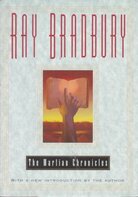I recently came across a 2011 poll taken by NPR Books, in which more than 60,000 people who read F & SF voted, thus generating a list of the top 100 books in these two genres.
Below are some of my personal favorites. By clicking on each title, you can access the books at Goodreads and Amazon; the comments accompanying each book are mine.
The complete NPR list of 100 books is available HERE.
Tolkien's immortal epic, sold in both one-volume and three-volume formats, has been the reading delight of several generations of fantasy fans since its publication in the mid-1950s. The author, an Oxford professor, made full use of his expertise in and love for ancient myths and languages in this richly-detailed masterpiece, which tells the story of the War of the Ring, pitting the seemingly insignificant hobbit, Frodo Baggins, against the fearsome, evil, Sauron.
Fahrenheit 451, by Ray Bradbury
This is a mesmerizing, although horrifying and sobering look at what the world would be like if books were declared illegal, and burned when found in anyone's possession. The main character, a 'fireman', comes to realize just how special books are, and begins a journey of discovery from which he will never turn back.
The Foundation Trilogy, by Isaac Asimov
Asimov's declining Galactic Empire is the background for the founding of a special colony that will bring together all of humanity's knowledge throughout the centuries, as well as its aesthetic achievements. Hari Seldon, a leader in the field of psychohistory, is the founder of this unusual colony, which reminds me of Castalia, the fictional intellectual province so central to Herman Hesse's masterpiece, Magister Ludi , also known as The Glass Bead Game.
 Animal Farm, by George Orwell
Animal Farm, by George Orwell
A brilliant satirist, Orwell here creates a humorous, although chilling look at the development of a totalitarian regime. At the beginning of 'the revolution', the motto is "all animals are equal". By the time the dictatorship, obviously based on communism, is in place, the motto has changed to "all animals are equal, but some are more equal than others".

I, Robot, by Isaac Asimov
In this collection of related stories, Asimov brings to life his uique conception of robotic technology, with his highly original "Three Laws of Robotics". These tales reflect his preoccupation with the latent dangers of artificial intelligence for human beings.
Stranger in a Strange Land, by Robert Heinlein
The clash of cultures, especially religious beliefs, is portrayed in this novel. The Martian in question is really a human, born and raised on Mars, and brought to Earth as a young adult. Valentine Michael Smith is a mystic whose particular brand of off-world religion will transform the culture of Earth. The title refers to Exodus 2:22.

Dragonflight, by Anne McCaffrey
For centuries, the Dragonriders of Pern have staved off planetwide disaster due to the fall of Thread, which falls like rain, but destroys everything it comes in contact with. Now, the Red Star is approaching the planet, and there are very few riders left. Lessa, a lowly kitchen servant, meets a queen dragon, and realizes what her true destiny is.
I'm sure Paolini's Eragon series was based on McCaffrey's own books. It really galls me that her books were not made into movies first, when she was the original creator of the concept of dragonriders.

A Canticle For Leibowitz, by Walter M. Miller, Jr.
After civilization is nearly wiped out in a nuclear war, the Monks of the Order of St. Leibowitz the Engineer became the custodians of pre-war knowledge. Through long centuries, they endured. And then history began to repeat itself... This is a masterpiece of irony and even humor, which presents a staple of human nature, the repetition of historic cycles, with wit and style.
The Once and Future King, by T.H. White
This modern retelling of the Arthurian tales sparkles with humor and vivid characterization. It follows the life of King Arthur from his boyhood as brother to Kay, who calls him "The Wart", to his coronation as king of England, the establishing of the Round Table, and the adventures of the Holy Grail.
 The Martian Chronicles, by Ray Bradbury
The Martian Chronicles, by Ray Bradbury
This collection of eerie, mesmerizing tales covers the years of the colonization of Mars. They are poignant, reminiscent of smalltown Americana, and yet, strangely alien. Some of the stories are weirdly humorous, but they all share an atmosphere of past nostalgia mixed with the reality of a new world, in the future.
There's also a printable version of the complete list, which you can access HERE.
For more details about each of the books that made the list, just go to the original post, and click on the book images. Enjoy!!
For more details about each of the books that made the list, just go to the original post, and click on the book images. Enjoy!!









